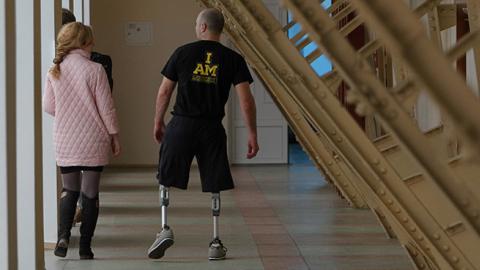The United Kingdom’s Prince Harry helped found the Invictus Games in 2014 as a way to pay tribute to the sacrifices made by the wounded and disabled veterans of the Iraq and Afghanistan Wars, and to make an example of their courage and determination. For the 2017 iteration of the Games an invitation was extended to Ukraine for the first time. The Ukrainian team of fifteen—plus eleven alternates—joined 550 athletes from 16 other nations for the third convocation of the Games, which were held in Toronto. While Ukraine—like all the invited nations—did take part in operations in Iraq and Afghanistan, most of its team members were wounded in the ongoing war with Russia in eastern Ukraine.
The Invictus Games only pushed their way into US headlines to profile an adorable little girl stealing Prince Harry’s popcorn But Ukraine’s media covered their team quite heavily, publishing articles about each new medal won, and profiling the lives and military service of the team members. Of course, the team represented only a tiny percentage of the Ukrainian soldiers who have been injured in the past three years, but their example to both their fellow wounded comrades and to ordinary citizens was a powerful one.
For Ukrainians, who have pulled together to crowd-source supplies and equipment for their army and volunteer battalions, the success of their wounded warriors on an international stage was a mark of national pride. But, besides having signaled to Ukrainians that the free world sees their struggle as an honorable one, the games have had the added benefit of stirring the nation’s collective consciousness on the disabled among them. Ukrainian society has not been historically accustomed to accommodating the disabled—many veterans of the unpopular Soviet war in Afghanistan were simply ignored, and handicapped children were often given up to orphanages during Soviet times. The Invictus Games have gone a long way towards sensitizing the public by humanizing the challenges faced not only by their soldiers wounded in war, but also by all citizens challenged with disabilities
To their fellow wounded veterans, the Ukrainian team’s performance was an inspiring example of what can be accomplished after debilitating injury. Thousands of men and women like them – most very young – are searching for ways to rebuild their lives and continue to contribute to Ukraine’s future. Organizations like https://www.facebook.com/%D0%94%D0%BE%D1%81%D1%82%D1%83%D0%BF%D0%BD%D0%BEUA-1617803701799770/"><i>Dostupno</i> have emerged to help these soldiers along their way, but that movement now has a public, vocal, and successful face. The participating soldiers have spoken of the importance that sport and working towards participation in the Invictus Games made in their recovery. Team member Vadim Sviridenko explained it to Ukrainian magazine Novoye Vremya simply: “If you can run, you are alive.”
The Ukrainian team finished the Invictus Games with 14 medals, including 8 gold.
















